COVID-19 pandemic highlights during first presidential debate of 2020
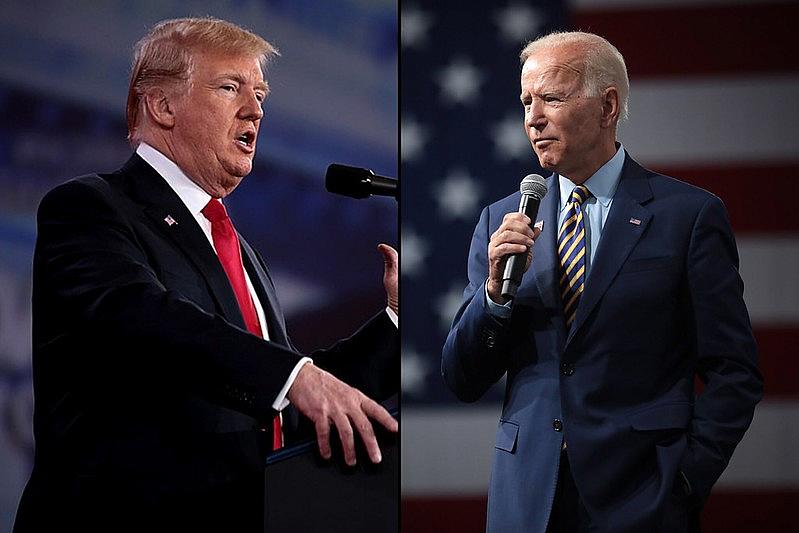
Photo by Flicker via Gage Skidmore
“This was the debate from hell,” as an op-ed by former Bush advisor Karl Rove put it in the Wall Street Journal.
But the topics of health, climate change and systemic racism did manage to make appearances in ways we haven’t seen before in previous debates. Here's a rundown of some of the most memorable exchanges, and how Americans reacted via the dominant political arena of the moment: Twitter.
The debate kicked off with the topic on most American’s minds right now: Trump’s handling of the COVID-19 pandemic, and what Biden would do differently if given the chance.
Jeremy Konyndyk, senior policy fellow at the Center for Global Development, performed a public service by live fact-checking Trump’s comments on Twitter.
Trump said repeatedly that he had saved “millions of lives” by imposing a travel ban on China. The president argued that under Biden’s presidency, the country would have been left open, comparing his leadership during the pandemic to the Obama administration's handling of the H1N1 flu, when nearly 12,500 Americans died, compared to the sobering 200,000 U.S. death milestone recently met by the current pandemic. Konyndyk shared Biden's comments from earlier this year, when the former vice president argued that the act of banning travel to China - or any other country - was not in itself a plan to combat the novel coronavirus.
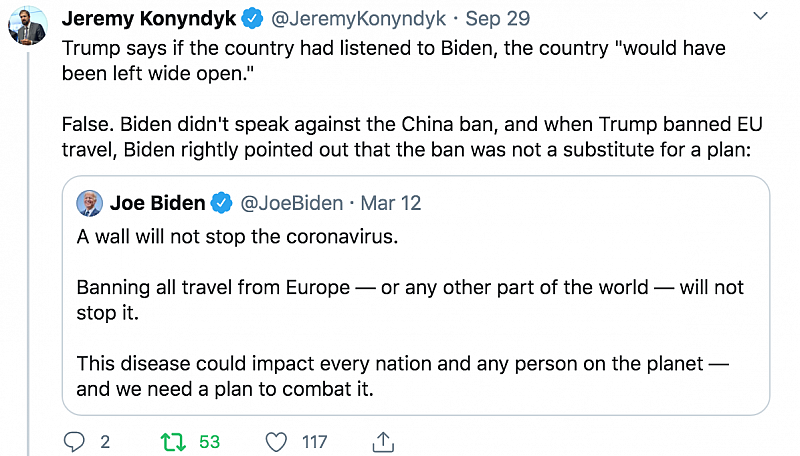
Konyndyk points out that although China delayed public disclosure of the virus, the Trump administration and the CDC were made aware of its devastating potential in early January 2020.
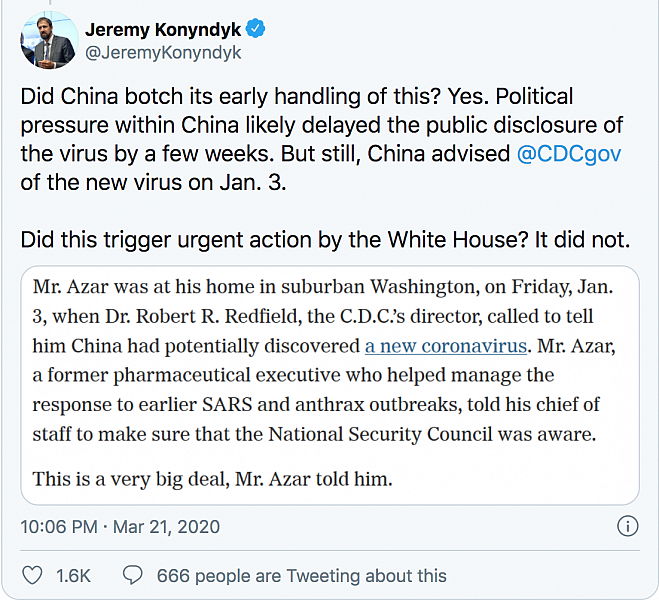
Trump also shirked responsibility for a national response to the pandemic, placing blame on individual states that imposed stricter lockdowns. Konyndyk pointed out that the Republican-led states in the Sun Belt that reopened prematurely experienced large case surges over the summer, while states that clamped down, such as New York and New Jersey, saw less of a summer spike.
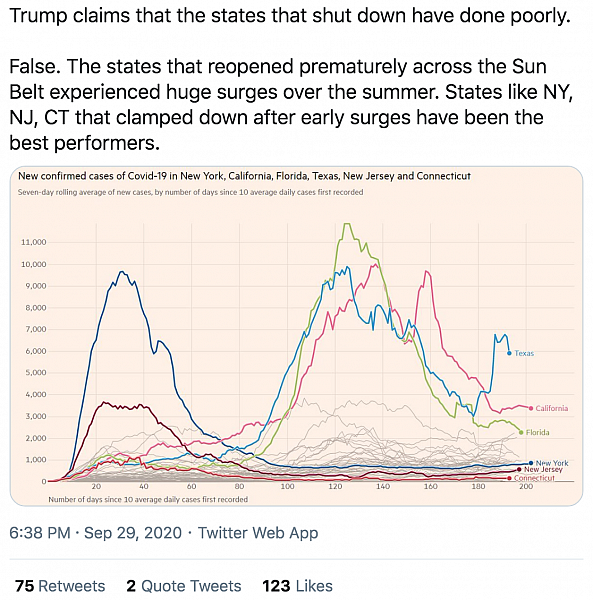
There has been widespread concern that the arrival of an effective COVID-19 vaccine could be rushed due political pressure from the Trump administration. When debate moderator Chris Wallace cited comments from CDC director Dr. Robert Redfield Jr. that suggested a vaccine may not be widely available to the American public until the summer of 2021, Trump repeatedly interrupted to say that a vaccine would be ready “very, very soon,” and before the end of the year, pointing to his trust in pharmaceutical companies' ability to deliver ahead of schedule.
Health care reporter Caroline Chen of ProPublica tweeted about why this is highly unlikely, sharing her recent piece on how to tell a political stunt from a real vaccine.
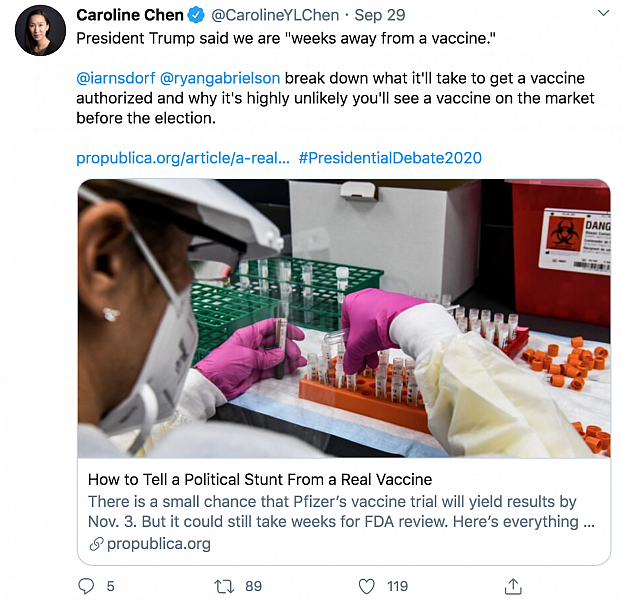
All that was before the question of race was raised by Wallace. When asked to comment on how he would handle racial division in the country, Biden immediately evoked scenes from the infamous Charlottesville, Virginia Unite the Right rally in 2017, a white supremacist protest that culminated in the murder of a counter-protestor. A political scandal then ensued when Trump failed to condemn white supremacists and said the blame for violence fell “on both sides.”
“This is a president that has used everything as a dog whistle to generate racist division,” said Biden. “One in 1,000 African Americans has been killed because of the coronavirus, and if he doesn't do something quickly by the end of the year, one in 500 African Americans will have been killed. What he did has been disastrous for the African American community.”
Trump started to cite Biden’s 1994 crime bill, and falsely attributed to Biden Hillary Clinton's infamous "super-predator" comments used in support of the bill, but soon launched into a long tirade about law enforcement and Trump’s presumed support from that community.
“You can't even say the word law enforcement,” Trump told Biden, “because if you say the word you're going to lose all of your radical left supporters.” The conversation devolved from there, with Trump referring to racial sensitivity training as “very bad, very sick ideas” that “teach people to hate our country.”
When asked by Wallace to condemn white supremacists and their actions, Trump wavered before uttering the now infamous line, “Proud Boys, stand back and stand by.” This set off a Twitter storm, as people voiced outrage over his hesitancy to condemn white supremacy as well as his seeming call to action to Proud Boys, a far-right organization that engages in and promotes political violence.
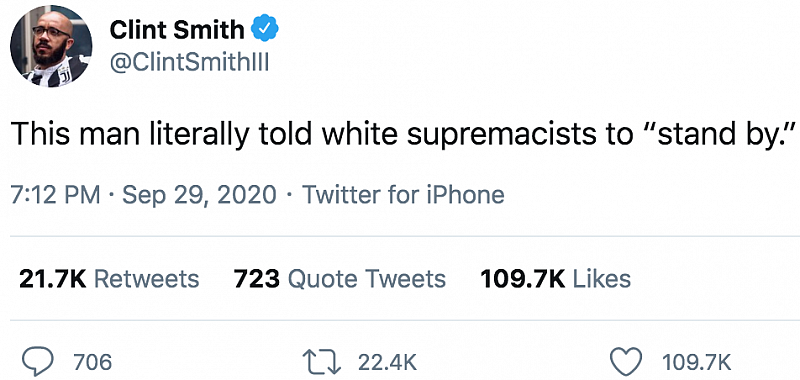
During the last 10 minutes of the debacle, Wallace asked the candidates for their beliefs on climate change, a topic that was absent from presidential debates in 2016. While millions of acres across the West have been destroyed by deadly wildfires, the President repeated his usual talking points, blaming the fires in the West on “poor forest management.”
When asked again about his beliefs on climate science Trump replied, “I want crystal clean water and air, we have now the lowest carbon … if you look at our numbers now we are doing phenomenally.” Trump characterized the Paris Climate Accord as a disaster while failing to explain why he rolled back the Obama-era clean power regulations.
Trump’s comments drew comparisons to the greedy mayor Aloysius O'Hare from the Dr. Suess-inspired "Lorax" movie, who tries to sell clean air to his residents. The movie is still trending on Twitter as I type.
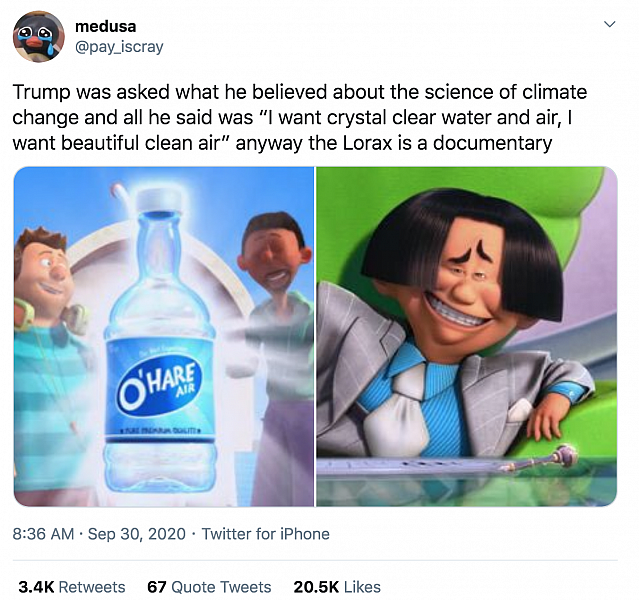
Biden said under his presidency the U.S. would rejoin the Paris Accord, and provide tax incentives to help people weatherize their buildings and homes. “We're going to be in the position to create hard, good jobs by making sure the environment is clean and we all are in better shape,” Biden said. “We spend billions of dollars now on floods, hurricanes, and rising seas. We're in real trouble.” When Trump brought up the cost of the Green New Deal, a proposed package of legislation championed by New York House Representative Alexandra Ocasio-Cortez, Biden distanced himself from it. “That is not my plan. I support the Biden plan that I put forward.”
The collective verdict online: This was not the debate we needed or wanted in 2020, a year marked by national and global suffering and divisiveness, but also historic reckonings with racism that have united people of all colors around the world, while bringing out the worst in others.
Just how unbearable was it? Bad enough to prompt headlines like this one from The Washington Post: “For the sake of the country, cancel the remaining debates.”
Photo by Flicker via Gage Skidmore

